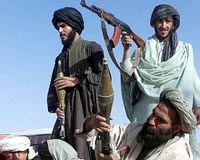| . |  |
. |
Mogadishu, Somalia (UPI) Sep 15, 2009 The reported assassination in Somalia of one of Africa's most wanted jihadists by U.S. Special Forces underlines concern among Western intelligence services that al-Qaida is moving veteran fighters to the Red Sea and the Horn of Africa. According to U.S. and Somali officials, the U.S. troops carried out the attack Monday in four helicopters launched from an American warship in the Indian Ocean. They swooped, machine guns blazing, on a two-truck convoy carrying senior figures of the Shabab, the Islamist group fighting Somalia's beleaguered Western-backed transitional government, near the town of Baraawe in Shabab-controlled territory. The commandos killed nine men, including one identified by U.S. officials as Saleh Ali Saleh Nabhan, a baby-faced veteran al-Qaida operative based in Kenya who was said to be close to Fazul Abdullah Mohammed, al-Qaida's chief in East Africa. Nabhan was wanted for the Nov. 28, 2002, bombing of the Israel-owned Paradise Hotel in Mombasa, Kenya, and a simultaneous missile attack on an Israeli airliner shortly after it took off from the Kenyan city's airport. Eleven Kenyans and three Israelis were killed in the hotel bombing. There were no casualties in the attack on the charter jet, packed with Israelis returning home from vacation, because two missiles fired at it missed. U.S. officials say Nabhan helped fire the missiles. In Monday's attack, the U.S. soldiers took the bodies identified as Nabhan and his companions back to the warship for further identification. The Americans have been gunning for the Kenyan-born Nabhan and other al-Qaida operatives known to be in war-torn Somalia for some time. He and Mohammed have been the targets of several airstrikes. Mohammed remains at large. He is wanted for masterminding the August 1998 bombings of the U.S. embassies in Nairobi and Dar-es Salaam, Tanzania, in which more than 200 people were killed. Nabhan was suspected of participating in those attacks. The last senior Islamist figure in Somalia to be assassinated by the Americans was Aden Hashi Ayro, one of the top jihadist commanders, on May 1, 2008. The house where Ayro, who reportedly introduced suicide bombings into the Somali imbroglio, was hiding out was obliterated by a salvo of five Tomahawk missiles fired from a U.S. warship. Fifteen other people were also killed. In recent months there have been persistent reports that veteran al-Qaida field commanders and fighters are being funneled into Somalia and crisis-torn Yemen, across the southern end of the Red Sea. Officials say it is difficult to provide numbers, but U.N. officials in Somalia say foreign fighters in the Shabab constitute an elite unit that is considered highly disciplined, unlike the bulk of the Shabab's Somali clan warriors. The Shabab has operational links with al-Qaida in the Arabian peninsula, known as AQAP, which is gathering strength in Yemen at a time when the Sanaa government is tied up fighting a tribal insurgency in the north and a swelling secessionist movement in the south. A report by the Intelligence Committee of the U.S. House of Representatives in July noted that Somalia and Yemen are becoming sanctuaries for jihadists, particularly from Pakistan and Afghanistan. "The Committee is concerned with the threat of increasingly instability in Yemen and the continuing turmoil in Somalia," the report stressed. "History has demonstrated that al-Qaida and its affiliates seek out those countries with either a weak central government or significant instability to use as safe havens from which to plot against the United States or U.S. interests abroad." Earlier this month U.S. and Pakistani officials reported that mid-level al-Qaida leaders were establishing bases in Somalia and Yemen, reflecting the mounting pressure on al-Qaida and its Taliban allies in Pakistan by unmanned U.S. killer drones. These have killed a score of senior jihadist and Taliban figures over the last 18 months. U.S. officials did not explain the timing of the attack on Nabhan Monday, although it may have been dictated by real-time intelligence that pinpointed his exact location. However, U.S. President Barack Obama reportedly signed the order to eliminate him 10 days ago, decreeing that he should be killed at the earliest opportunity. If true, that suggests Nabhan was hit for a specific purpose.
Share This Article With Planet Earth
Related Links The Long War - Doctrine and Application
 Commentary: Al-Qaida 360
Commentary: Al-Qaida 360Washington (UPI) Sep 11, 2009 Pity the al-Qaida analyst in the 16-agency, 100,000-strong U.S. intelligence community that spends $50 billion a year, much of it to track al-Qaida operatives the world over. President Obama made clear during last year's presidential campaign Afghanistan would be his war if elected. And since being sworn in, true to his word, the Afghan war is now a national security imperative because ... read more |
|
| The content herein, unless otherwise known to be public domain, are Copyright 1995-2009 - SpaceDaily. AFP and UPI Wire Stories are copyright Agence France-Presse and United Press International. ESA Portal Reports are copyright European Space Agency. All NASA sourced material is public domain. Additional copyrights may apply in whole or part to other bona fide parties. Advertising does not imply endorsement,agreement or approval of any opinions, statements or information provided by SpaceDaily on any Web page published or hosted by SpaceDaily. Privacy Statement |